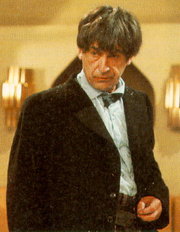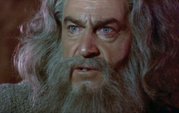Patrick Troughton
Patrick George Troughton (March 25, 1920–March 28, 1987) was a versatile and prolific British actor best known in his role as the second incarnation of the Doctor in the long running British sci-fi TV series Doctor Who, which he played from 1966 until 1969. more...
Troughton's notable film roles include Sir Andrew Ffoulkes in The Scarlet Pimpernel (1954), Phineas in Jason & the Argonauts (1963), Father Brennen in The Omen (1976), Melanthius in Sinbad and the Eye of the Tiger (1977), and Cole Hawlings in a BBC TV dramatisation of the John Masefield children's book The Box of Delights (1984)
He also guest starred in the British comedy television series The Goodies in the episode "The Baddies", as well as in episodes of the British television series Survivors, Minder and The Persuaders! . In 1953 he became the first actor to play the famous folk hero Robin Hood on television, starring in six half-hour episodes broadcast from March 17 to April 21 on the BBC, and titled simply Robin Hood (Vahimagi, 42).
Doctor Who
In 1966, Doctor Who producer Innes Lloyd decided to replace William Hartnell in the series' lead role. Lloyd later stated that Hartnell had approved of the choice, saying, "There's only one man in England who can take over, and that's Patrick Troughton" (Howe, Stammers and Walker, 68). Lloyd chose Troughton because of his extensive and versatile experience as a character actor. After he was cast, Troughton considered various ways to approach the role, to differentiate his portrayal from Hartnell's amiable-yet-tetchy patriarch. Troughton's early thoughts about how he might play the Doctor included a "tough sea captain" and a piratical figure in blackface and a turban. Doctor Who creator Sydney Newman suggested that the Doctor could be a "cosmic hobo" in the mold of Charlie Chaplin, and this was the interpretation eventually chosen (Howe, Stammers and Walker, 68–69).
During his time on the series, Troughton tended to shun publicity. He told one interviewer, "I think acting is magic. If I tell you all about myself it will spoil it" (Howe, Stammers and Walker, 72). Years later, he told another interviewer that his greatest concern was that too much publicity would limit his opportunities as a character actor after he left the role (KTEH interview).
Troughton was popular with both the production team and his co-stars. Producer Lloyd credited Troughton with a "leading actor's temperament. He was a father figure to the whole company and hence could embrace it and sweep it along with him." Troughton also gained a reputation on set as a practical joker (Howe, Stammers and Walker, 68, 74).
Regrettably, many of the early episodes in which Troughton appeared were disposed of by the BBC (a full list of Doctor Who episodes missing in the BBC Archives is available here). Troughton found Doctor Who's schedule (at this time, 40 to 44 episodes per season) grueling, and decided to leave the series in 1969, after three years in the role. This decision was also motivated in part by fear of typecasting (Howe, Stammers and Walker, 75; KTEH interview).
Read more at Wikipedia.org



